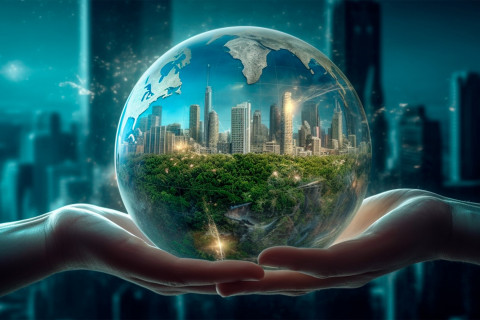Social inclusion and having a sense of belonging with other people are key elements of a good life. However, the fate of humanity is a challenge that extends beyond our social reality. Experiences of belonging and inclusion, understood in a broader sense than before, may be crucial for a sustainable future.
In an article published in International Journal of Social Pedagogy, a team of researchers propose a new Planetary Inclusion Scale that structures our planetary relationship three-dimensionally based on temporal, spatial and ethical orientation. The temporal element relates to the link between generations: those who lived before us have created the foundation upon which we are building our well-being today. Similarly, the choices we make today will affect the lives of generations to come – whether we like it or not.
The spatial element, in turn, is about how the foundation of our well-being is largely built on resources from outside our own area. Nowadays, our everyday life is typically connected to the lives and environments of people in faraway places.
“We often oversimplify reality by thinking in point-like manner, for example that electricity comes from the socket, water from the tap, and jeans from the store,” Professor Arto O. Salonen of the University of Eastern Finland, the first author of the article introducing the Planetary Inclusion Scale, notes.
The Planetary Inclusion Scale also involves the idea of broader ethical thinking. Transcending the human-biosphere boundary in life-preserving ways is increasingly important.
Evaluating personal beliefs and experiences helps to become aware of one’s planetary relationship. The nature of this relationship is increasingly central when seeking solutions to climate change, biodiversity loss and the depletion of natural resources.
The Planetary Inclusion Scale works in such a way that the respondent evaluates their life as a whole by considering the following statements, for example, on a scale of 1–7.
- I feel that my presence in the world is significant.
- I believe that those who will live after me will be satisfied with my choices.
- I feel I do not belong only in a community or a nation, but on a single and finite planet.
- I believe that the planet needs me to preserve future opportunities for a good life.
- I can influence the intertwined future of me and the planet.
- I experience meaningfulness.
- I am engaged in broadening my sphere of care.
- I belong to the world that supports my life.
- I live in peace and harmony with the world.
- I am part of the intergenerational chain and contribute to the world to make it a better place.
The strength of the Planetary Inclusion Scale lies in its ability to make visible the diverse ways in which humans are connected to their surrounding world. Each of the connections identified can give meaning to life, increase experiences of belonging and inclusion, expand the sphere of care, and raise awareness of one’s own possibilities for influence.
Research article:
Salonen, AO., Isola, A-M., Jakonen, JP & Foster, R. (2024). Who and what belongs to us? Towards a comprehensive concept of inclusion and planetary citizenship. International Journal of Social Pedagogy 13(1), 5


